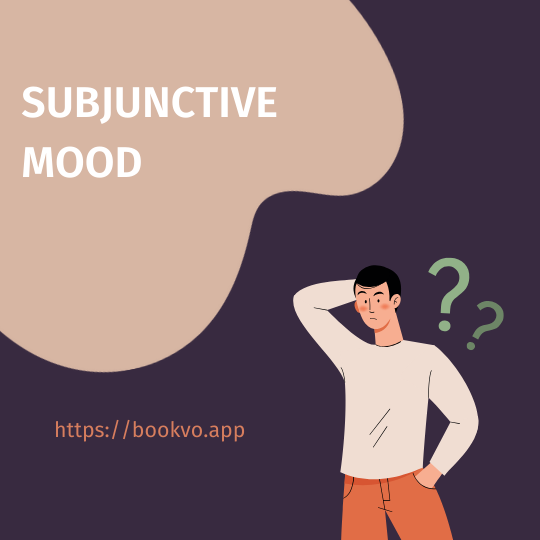The subjunctive mood is a unique and somewhat elusive aspect of English grammar that expresses wishes, hypotheticals, demands, or suggestions. Unlike the indicative mood, which states facts, or the imperative mood, which gives commands, the subjunctive mood deals with situations that are not necessarily real. Understanding how to use the subjunctive mood correctly can add depth and precision to your English communication.
Understanding the Subjunctive Mood
The subjunctive mood is used to describe situations that are contrary to reality, hypothetical scenarios, wishes, demands, or suggestions. It often appears in complex sentences and can be identified by specific verb forms that differ from the indicative mood.
Examples:
- If I were rich, I would travel the world. (Hypothetical)
- I suggest that he study harder. (Suggestion)
- It is important that she be informed. (Demand)
Forms of the Subjunctive
The subjunctive mood primarily affects the verb "to be" and other verbs in certain constructions.
1. Present Subjunctive
The present subjunctive is used in that-clauses after verbs of suggestion, demand, or request. The verb remains in its base form regardless of the subject.
Examples:
- I recommend that she take the course.
- The doctor insists that he follow the diet.
- It is essential that everyone be present.
2. Past Subjunctive
The past subjunctive is most commonly seen with the verb "to be," where "were" is used for all subjects, even when "was" would normally be used.
Examples:
- If I were you, I would apologize.
- She wishes she were taller.
- If he were here, he would know what to do.
Uses of the Subjunctive Mood
1. Expressing Wishes and Desires
Use the subjunctive to express wishes or desires, often with verbs like "wish" or "if only."
Examples:
- I wish I were on vacation.
- If only it were summer all year round.
2. Hypothetical Situations
Use the subjunctive to discuss hypothetical or contrary-to-fact situations, typically in if-clauses.
Examples:
- If she were the president, she would implement better policies.
- If they were aware of the consequences, they would act differently.
3. Suggestions, Demands, and Recommendations
Use the subjunctive in that-clauses following verbs that express suggestions, demands, or recommendations.
Examples:
- The teacher suggested that he read more books.
- The manager demanded that the report be finished by Friday.
- It is crucial that the instructions be followed precisely.
4. Formal Expressions
The subjunctive mood often appears in formal expressions or legal language.
Examples:
- Be it resolved that the meeting will commence at 9 AM.
- Heaven forbid that anything should happen to her.
Common Mistakes and Tips
1. Confusing the Subjunctive with the Indicative
The subjunctive mood can look similar to the indicative mood, leading to confusion. Pay attention to the context and the verbs that trigger the subjunctive.
- Indicative: If he was late, he missed the train.
- Subjunctive: If he were late, he would miss the train.
2. Forgetting the Base Form
When using the present subjunctive, ensure the verb remains in its base form, even if the subject changes.
- Incorrect: It is essential that she studies hard.
- Correct: It is essential that she study hard.
3. Using "Was" Instead of "Were"
In the past subjunctive, "were" should be used for all subjects when expressing hypotheticals.
- Incorrect: If I was rich, I would buy a mansion.
- Correct: If I were rich, I would buy a mansion.
Conclusion
The subjunctive mood adds a layer of complexity and nuance to English grammar, allowing speakers and writers to express wishes, hypotheticals, and suggestions with precision. By understanding its forms and uses, you can enhance your language skills and communicate more effectively. Practice identifying and using the subjunctive mood in various contexts to master this important aspect of English grammar.
Download Now!










